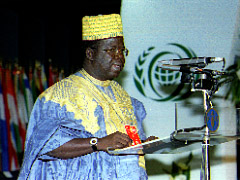


LIBERIA | ||
His Excellency Samuel S. Dokie, Speaker of the House of Representatives of the Republic of Liberia | ||

My Government and the people of Liberia present their compliments and warm sentiment to the people and Government of the Republic of Italy and for their overall support and for creating the most appropriate and conducive environment, which allows distinguished delegates from all over the world to express their views and candid opinions on the auspicious occasion of this high-powered conference pertinent to the World Food Summit at FAO Headquarters in this great city of Rome. The Liberian delegation wishes to congratulate the Director-General of FAO, Dr. Jacques Diouf, for a splendid job well done in organizing this global Summit on food, which is indispensable to the existence of mankind. Following nearly seven years of socio-economic and political upheaval, due to a civil war unprecedented in its history, Liberia finds herself in a precarious situation characterized by food deficit which has negative consequences on the population. There are vivid signs of diseases, malnutrition and debility due to lack of food and severe hunger. The population relies on rice and cassava as their major source of carbohydrates, while fish and meat serve as the basis for protein and local assorted vegetables and fruits for vitamins. Food growers are finding it increasingly difficult to carry out farming activities due to insecurity and acute shortages of seeds, tools and other related farm inputs. Many farmers are displaced internally. By and large, access and feeder roads are covered with bush or blocked by fallen trees from storms. Additionally, many bridges that connect major farms to market roads are either damaged or destroyed. For these and other reasons, most farmers are incapacitated. Consequently, the population has generally been surviving on food aid and wild foods. There are some commercial imports of rice, the staple food but persons cannot afford this vital commodity because they lack the purchasing power, except for those who are reliant on income transfer. There is a high rate of unemployment while income-generating activities are non-existent. According to the World Food Programme, Liberia benefitted from food aid rice amounting to more than 120 000 metric tons, including more than 60 886 metric tons of bulgur wheat and more than 12 000 metric tons of vegetable oil between the period 1991-1996. There are no indications of substantial shortages of basic food that are grown locally such as cassava and assorted vegetables. In this connection, local production is generally satisfactory, meeting the demands of citizens who live in areas occupied by the West African Peace Keeping Force. The Economic Community of West African States (ECOWAS) needs your assistance to help our country to peace and to transform us from beggars to producers. Inflation is raping the already non-performing economy, thus making it virtually impossible for smallholders to purchase basic inputs for the crop, livestock and fisheries sectors. The main cause of this trend is almost certainly the acute decline in production activities, minimal income-generating activities and the shortage of consumer goods. Paramount among these current constraints is the major problem of security resulting in the harassment of food producers, the restraints on movement due to the existence of checkpoints manned by armed men of various factions in the various sub-political divisions of Liberia. ECOWAS needs the help of the world body. Due to the nearly total collapse of the national economy of Liberia, it is still in a state of emergency struggling frantically to transform itself from this situation to development. The donors and international NGOs have been crucial and vital in assisting diverse vulnerable groups affected as a direct result of the civil war. The World Food Programme resumed assistance in food aid for war-torn Liberia in the latter part of 1990. Since then, the magnitude of assistance in food aid has varied over the years depending on the number of IDPs, returnees and voluntary repatriation. Against this background, the Liberian delegation wishes to express its deepest gratitude towards the donors and international community for their continuing humanitarian relief assistance to our war-ravaged country. We would like to use this opportunity to appeal to this august body to strive relentlessly in assisting enormously to bring lasting peace to Liberia, which will provide for disarmament, demobilization of former combatants, resettlement of the internally displaced, repatriation of many refugees geared towards rehabilitation, and reconstruction. Finally, we wish to close with these rhetorical questions: · Since the last, 1974 World Food Conference, why has there been an increase in the number of hungry people in the world? · Why has the end of the Cold War not created an atmosphere of greater food production for the hungry people of the world? · Why are there no coups d'état in the so-called developed world? · Why are there no rebel groups in the highly advanced industrialized countries? More than 80 percent of the hungry people in Africa and the so-called Third World are the result of coups d'état and wars. Let the industrialized countries who manufacture destructive weapons of war, that are responsible for most of the 800 million hungry people, instead manufacture a greater number of agricultural implements and other accessories and inputs to produce more food. Let us all, rich and poor countries, become honest, sincere and realistic so that the Rome 1996 World Food Summit and its noble objective, Food for All can be a reality in our one Global Village. | ||
|
|
|
|

 |